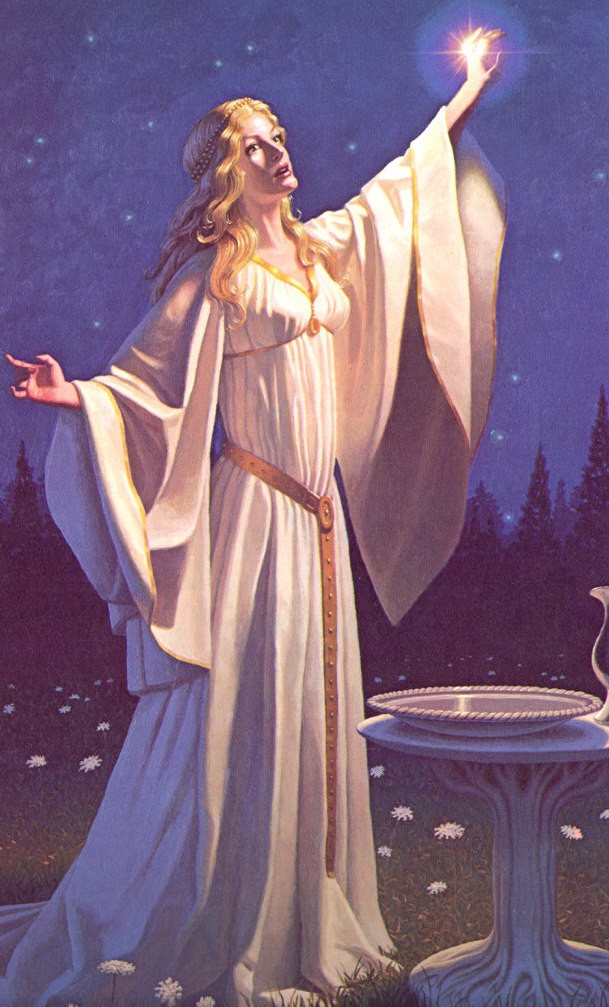From The One Ring:
Following the destruction of the Two Trees, their great Elf-king Finwë’s death at the hands of Morgoth, the theft of the Silmarils, and in defiance of Eru and the Valar, the arrival and lingering presence of the Noldor (tribe of Elves descended from Finwë) on Middle-earth resulted in their inevitable decline as a people. Yet, the hubris, ingenuity, and might of the Noldor also meant they were a great force to be reckoned with.
They are the chief artificers of devices (“rings”) that halt fading in the Second and Third Age.
In The Rings of Power, the fading of the Noldor is discreetly translated through the Tolkienian metaphor of suffering trees. Given their presence on Middle-earth is consequential to their continued defiance to the Valar, the Noldor’s faltering faith is represented in their inability to keep their beloved Mallorn trees (plural Mellyrn) from fading. (Read more.)
Galadriel's path to redemption. From TOR:
Galadriel’s first words in The Lord of the Rings position her firmly within the tradition of Tolkienian women. When the Fellowship reaches Lothlórien, and it becomes clear to the Lord and Lady that Gandalf is not with them, Celeborn is concerned. Was there a change of plans? he wonders. Or perhaps he misunderstood Elrond’s message? Galadriel, and not one of the Company, responds. “‘Nay, there was no change of counsel,” she informs her husband, speaking in a voice unusually deep. “Gandalf the Grey set out with the Company, but he did not pass the borders of this land. Now tell us where he is; for I much desired to speak with him again. But I cannot see him from afar, unless he comes within the fences of Lothlórien: a grey mist is about him, and the ways of his feet and of his mind are hidden from me” (LotR 335).
Galadriel, we can infer here, is something of a seer. She can watch the progress of the world from afar, though at least Gandalf is a mind that is closed to her. This is, of course, all the clearer when she uses the intensity of her gaze alone to interrogate and test the resolve of each member of the Fellowship. And again, we witness her seer-like qualities in a very traditional sense when she invites Frodo and Sam to look in her Mirror and see what Sam innocently calls “Elf-magic.”
What stands out to me about Galadriel’s characterization in The Lord of the Rings is that she is, first and foremost, discerning. Yes, she’s powerful, mysterious, ancient, and sorrowful; but her reactions to the people and events of the world around her are always wise and measured.
Consider her response to Celeborn’s rather insensitive accusation of the Dwarves’ role in waking the Balrog. First, she gently corrects him—not in a way that shames him or undermines him in front of their guests, but also in a way that brooks no refusal. Galadriel then turns to Gimli, offering understanding and a welcome which changes the trajectory of the Dwarf’s entire narrative. She calls on the Lord Celeborn to place himself in Gimli’s shoes; and then, in case anyone was in doubt as to what she meant, she turns to the Dwarf and speaks to him of the beauty of his people’s treasured places—and does so in his own tongue.
This shows incredible discernment. Galadriel knows exactly what will defuse the tense situation, exactly what Gimli needs to hear in order to set aside his ingrained prejudices, exactly what Legolas needs to hear in order to do likewise, setting the stage for their mutual acceptance and deep friendship. The Fellowship is immeasurably better for that one, lifechanging moment.
She wasn’t always like that, though. Though she first appears as the wise woman of The Lord of the Rings, Tolkien continued to add complexity to her character even after it was published, and along with that complexity, her power and influence in Middle-earth also grow. Oddly, then, Tolkien’s writing of the character moved from future to past, and he wasn’t at all sure of her history when she first stepped from the shadows of the trees to offer light and comfort to weary travelers. And he never was quite sure… In the last month of his life he continued to alter Galadriel’s story, leaving us a trail full of contradictions and half-certain sketches. Indeed, according to Christopher Tolkien, “”There is no part of the history of Middle-earth more full of problems than the story of Galadriel and Celeborn, and it must be admitted that there are severe inconsistencies ‘embedded in the traditions’; or, to look at the matter from another point of view, that the role and importance of Galadriel only emerged slowly, and that her story underwent continual refashionings” (Unfinished Tales, hereafter UT, 220). But we’re getting ahead of ourselves already. (Read more.)
More HERE.



















No comments:
Post a Comment